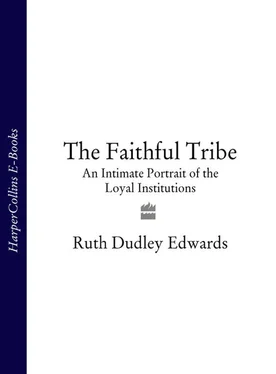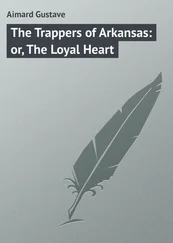Books, other than the Bible, are uncommon except in the houses of ministers and of teachers, but even there they will tend to be tucked away in a separate study. There is no clutter of papers or newspapers and few, sometimes no, objects. There might in some houses be a glass bookcase for treasures, with a heavy emphasis on Tyrone crystal wedding gifts too special to be used. (In the other community you’re more likely to have most of your fragile wedding gifts broken within a year or so of marriage courtesy of the exuberant clumsiness of yourself or your guests.) There will be a plethora of little tables so placed to ensure every person sitting in that living-room can eat and drink comfortably, for from the moment you come through the door, the lady of the house is preparing a tray full of food and drink: tea or coffee, two or three kinds of biscuits and home-made cake.
If you are there at a meal time you’ll be offered meat and potatoes and two kinds of sweet. If it’s not a meal time and they discover that you’ve missed your dinner (one o’clock) or your tea (six o’clock), your hostess will race to the kitchen to make piles of sandwiches, and fetch the home-made apple pie or whatever else is necessary to save you from starvation. Ulster Protestants are terrified lest their guests die of hunger; Ulster Catholics lest they die of thirst. Mind you, while drink is rarely on offer in a Protestant home as a part of normal hospitality, the occasional host might offer whiskey. And if you ever find yourself in a pub with a drinking Protestant, they are as lavish as any of their Catholic counterparts.
By any standards, the kindness is stunning. Arrive at a stranger’s house for a night with no luggage, as I have done, and slippers and a cosy dressing-gown and spare toothbrushes and toiletries are pressed upon you with enthusiasm and efficiency. And people will put themselves out for you to an extraordinary degree. They think nothing of going thirty miles out of their way to pick you up or drive you somewhere. It’s as if the sheer order and routine of their lives makes it possible for you to be accommodated however demanding are your needs.
The perception of Ulster Protestants as dour and taciturn does not long survive spending time in their houses, for they absolutely love talking and stay up late with any visitor. I’ve sat up till two in the morning and later having thoroughly enjoyable conversations with the most upright, temperate and even teetotal of citizens.
Orange, Black or Apprentice Boy meetings can be fitted into an orderly existence. The wives know when the husbands are going out, where they’re going and who they will be with. Reactions to these activities go across the spectrum from an old-fashioned reverence for the man’s important business to a genial acceptance that they’re making a mystery out of a simple get-together. And in the rural areas at least, sanity and tolerance dominate the women’s reaction to their men’s activity; it is understood that men want to be together and that this provides an excuse. ‘How have you stood it?’ I asked one woman whose husband was so heavily involved in the Freemasons, the Orange and the Black that he was frequently out four to five evenings a week. ‘I know he’ll never come back drunk,’ she said.
*This is a serious cultural contrast with Irish Catholics, who blaspheme eloquently, imaginatively, profusely, unselfconsciously and with no intention whatever of giving offence. My language improves out of all recognition when I associate with most Orangemen. However, my brother points out that Protestants and Catholics are as bad as each other when it comes to claiming blasphemously that God is on their side.
*It is insufficiently appreciated in the Republic of Ireland that while the vast majority of Catholics refused to give their loyalty to the Northern Ireland state, most of those Protestants, including Orangemen, who found themselves on the wrong side of the border after Partition were never disloyal to the new state. I’ve seen on Orange parades in Northern Ireland those brave little contingents from Cavan or Monaghan or Donegal, still stoutly demonstrating their pride in their religion and their affection for the crown, before going home to the state which they have served loyally. Unlike most nationalists in Northern Ireland, southern Orangemen were good losers.
* Those Orangemen who worried that I might expose their cherished secrets to the world hadn’t realized that most of this information was published as early as 1835, in appendices to the Report of the Commons Select Committee on Orange Lodges. Tony Gray in his book on the Orange Order also went into considerable detail. The ritual is necessarily rather dull and repetitive; what I am providing here is just a cross-section of what is most important. I am breaking no confidences, and keeping no secrets of any significance.
† Goat-rides, however, are a part of ancient rural pagan rituals.
* James Wilson in ‘The Making of the Orange Order’, a video which includes footage of preliminaries to an initiation ritual.
* They can, however, laugh at their own bigotry. There’s the famous joke about the dying Orangeman who asked for a priest. ‘What do you mean, a priest?’ asked his one of his brethren. ‘You’ve been an Orangeman for sixty years. Why do you want to see a priest?’ ‘I want to become a Roman Catholic.’ ‘A Roman Catholic? Have you gone mad?’ ‘I have not. It’s just that I’d rather one of theirs died than one of ours.’
* It was sold in spring 2000.
* Josias Cunningham tells me that ‘champagne and canapes are foreign to Eldon’s Twelfth; we subsist on beer, tea and sandwiches like the rest! And at least we do stay on the field; one of the unfortunate recent trends at the Belfast demonstration is for lodges to retire for a hearty lunch at an adjacent hall or other centre, leaving the “field” looking very empty for much of the day.’
* Like signs and grips, the original purpose of passwords was very serious: in the revolutionary period during which the Orange Order was founded, it was necessary to be able to tell friend from foe. Passwords do not change much with time. Typical would be one of those disclosed to a House of Lords Inquiry in 1825: “Thus shalt thou say unto the Children of Israel’ is answered with, ‘I Am, hath sent me unto you’.
3
Onlookers, Participants and Opponents: the Twelfth
Different viewpoints*
THE BIG, BIG COLOURFUL, noisy day that was the Twelfth had a special magic in the grey, sober Belfast of earlier times. Rowel Friers, the cartoonist, remembered sticking his head out of the bedroom window full of excitement:
I peered out to the right and there they were – the flying banners, the glinting instruments of the bands, and the bowler-hatted, white-gloved, navy-serge-suited and brown-booted Orange-sashed gentlemen of the Order, no brother’s tailoring outdoing another, highly respectable, dignified and erect, they march to the rhythm of their bands. Occasionally, one of them might deign to give a regal nod of the head to an onlooker known to him, and no doubt already approved of by his brethren as an acceptable outsider.
The swordbearers and deacon pole-carriers stepped out with all the demeanour of generals, now and then taking a peep at their pride and joy – the banner. Most of these, I was to learn later, were painted by a Mr Bridgett, a craftsman specializing in that particular art form. This knowledge I gleaned from the son of the said gentleman, who I met at art college some years later. Many and varied they were: gold, silver, orange, purple, blue, all the colours and more than could have adorned Joseph’s coat. From portraits of William in battle, to Queen Victoria and her Bible (‘the secret of England’s greatness’), churches, angels, the Rock of Ages, memorial portraits to worshipful brothers who had passed on to that higher and grander lodge in the sky, it was a travelling art exhibition, before anyone dreamed of the Committee for the Encouragement of Music and the Arts or the Arts Council.
Читать дальше












